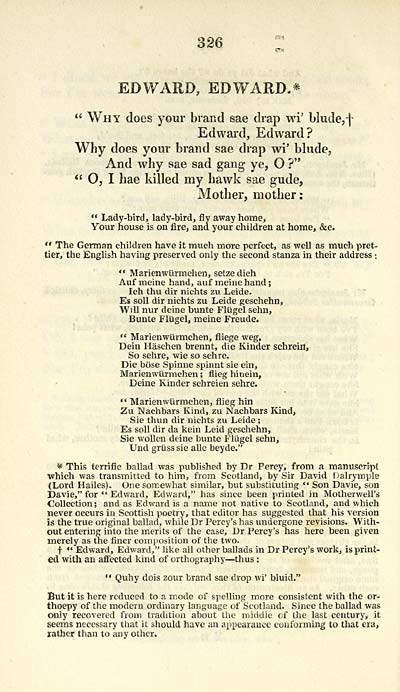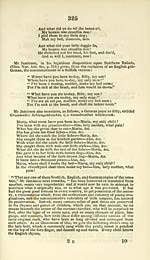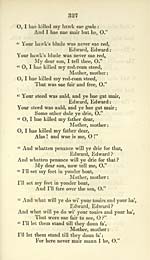Glen Collection of printed music > Printed text > Scottish ballads
(350) Page 326 - Edward, Edward
Download files
Complete book:
Individual page:
Thumbnail gallery: Grid view | List view

326
EDWARD, EDWARD.*
a Why does your brand sae drap wi' bludejf
Edward, Edward?
Why does your brand sae drap wi' blude,
And why sae sad gang ye, O ?"
" O, I hae killed my hawk sae gude,
Mother, mother:
" Lady-bird, lady-bird, fly away home.
Your house is on fire, and your children at home, &c.
" The German children have it much more perfect, as well as much pret-
tier, the English having preserved only the second stanza in their address :
" Marienwlirmehen, setze dich
Auf meine hand, auf meine hand ;
leh thu dir nichts zu Leide.
Es soU dir nichts zu Leide geschehn, :
Will nur deine bunte Flugel sehn,
Bunte Flugel, meine Freude.
" Marienwurmchen, fliege weg,
Dein Haschen brennt, die Kinder schreirl.
So sehre, wie so sehre.
Die bose Spinne spinnt sie ein,
Marienwlirmehen ; flieg hinein,
Deine Kinder schreien sehre.
*' Marienwurmchen, flieg hin
Zu Nachbars Kind, zu Nachbars Kind,
Sie thun dir nichts zu Leide ;
Es soil dir da kein Leid geschehn,
Sie wollen deine bunte Flugel sehn,
Und griiss sie alle beyde."
* This terrific ballad was published by Dr Percy, from a manuscript
which was transmitted to him, from Scotland, by Sir David Oalrymple
(Lord Hailes). One somewliat similar, but substituting ♦' Son Davie, son
Davie," for " Edward, Edv/ard," has since been printed in Motherwell's
Collection ; and as Edward is a name not native to Scotland, and which
never occurs in Scottish poetry, that editor has suggested that his version
is the true original ballad, while Dr Percy's has undergone revisions. With-
out entering into the merits of the case, Dr Percy's has here been given
merely as the finer comjiosition of the two.
t «' Edward, Edward," like all other ballads in Dr Percy's work, is print-
ed with an afi'ected kind of orthography — thus :
" Quhy dois zour brand sae drop wi' bluid."
But it is here reduced to a mode of speUing more consistent with the or-
thoepy of the modern ordinary language of Scotland. Since the ballad was
only recovered from tradition about tlie middle of the last century, it
seems necessary that it should have an appearance conforming to that era,
rather than to any other.
EDWARD, EDWARD.*
a Why does your brand sae drap wi' bludejf
Edward, Edward?
Why does your brand sae drap wi' blude,
And why sae sad gang ye, O ?"
" O, I hae killed my hawk sae gude,
Mother, mother:
" Lady-bird, lady-bird, fly away home.
Your house is on fire, and your children at home, &c.
" The German children have it much more perfect, as well as much pret-
tier, the English having preserved only the second stanza in their address :
" Marienwlirmehen, setze dich
Auf meine hand, auf meine hand ;
leh thu dir nichts zu Leide.
Es soU dir nichts zu Leide geschehn, :
Will nur deine bunte Flugel sehn,
Bunte Flugel, meine Freude.
" Marienwurmchen, fliege weg,
Dein Haschen brennt, die Kinder schreirl.
So sehre, wie so sehre.
Die bose Spinne spinnt sie ein,
Marienwlirmehen ; flieg hinein,
Deine Kinder schreien sehre.
*' Marienwurmchen, flieg hin
Zu Nachbars Kind, zu Nachbars Kind,
Sie thun dir nichts zu Leide ;
Es soil dir da kein Leid geschehn,
Sie wollen deine bunte Flugel sehn,
Und griiss sie alle beyde."
* This terrific ballad was published by Dr Percy, from a manuscript
which was transmitted to him, from Scotland, by Sir David Oalrymple
(Lord Hailes). One somewliat similar, but substituting ♦' Son Davie, son
Davie," for " Edward, Edv/ard," has since been printed in Motherwell's
Collection ; and as Edward is a name not native to Scotland, and which
never occurs in Scottish poetry, that editor has suggested that his version
is the true original ballad, while Dr Percy's has undergone revisions. With-
out entering into the merits of the case, Dr Percy's has here been given
merely as the finer comjiosition of the two.
t «' Edward, Edward," like all other ballads in Dr Percy's work, is print-
ed with an afi'ected kind of orthography — thus :
" Quhy dois zour brand sae drop wi' bluid."
But it is here reduced to a mode of speUing more consistent with the or-
thoepy of the modern ordinary language of Scotland. Since the ballad was
only recovered from tradition about tlie middle of the last century, it
seems necessary that it should have an appearance conforming to that era,
rather than to any other.
Set display mode to: Large image | Transcription
Images and transcriptions on this page, including medium image downloads, may be used under the Creative Commons Attribution 4.0 International Licence unless otherwise stated. ![]()
| Special collections of printed music > Glen Collection of printed music > Printed text > Scottish ballads > (350) Page 326 - Edward, Edward |
|---|
| Permanent URL | https://digital.nls.uk/87742177 |
|---|
| Description | Scottish songs and music of the 18th and early 19th centuries, including music for the Highland bagpipe. These are selected items from the collection of John Glen (1833 to 1904). Also includes a few manuscripts, some treatises, and other books on the subject. |
|---|
| Description | The Glen Collection and the Inglis Collection represent mainly 18th and 19th century Scottish music, including Scottish songs. The collections of Berlioz and Verdi collected by bibliographer Cecil Hopkinson contain contemporary and later editions of the works of the two composers Berlioz and Verdi. |
|---|

